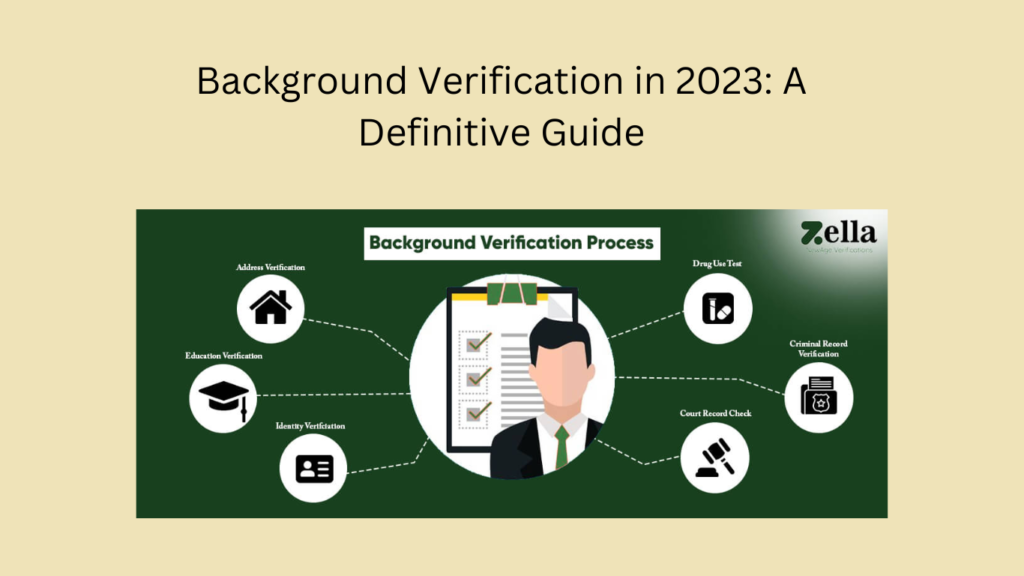In an era marked by technological advancements and a globalized workforce, the importance of background verification cannot be overstated. As we step into 2023, employers and individuals alike are navigating an evolving landscape where information is abundant yet often complex to sift through. This definitive guide aims to shed light on the key aspects of background verification in the current year, offering insights for employers, job seekers, and the general populace.
1. The Evolution of Background Checks
In the past, background checks primarily focused on criminal records and employment history. However, the landscape has transformed considerably. In 2023, comprehensive background verification extends beyond criminal records to include social media scrutiny, financial history, and even artificial intelligence assessments. Employers are leveraging advanced tools to gain a holistic view of candidates, ensuring a thorough understanding of their potential hires. This evolution in background checks not only influences hiring decisions but also underscores the importance of maintaining a professional and reputable online presence for individuals seeking to advance their careers.
2. The Role of Technology
Technology is at the forefront of background verification in 2023. Automated systems and machine learning algorithms are streamlining the process, making it more efficient and accurate. Artificial intelligence is employed to analyze vast datasets, providing employers with nuanced insights into a candidate’s suitability. While technology enhances the speed of verification, it also raises questions about data privacy and ethical considerations, prompting a careful balance between efficiency and responsible use.
3. Social Media Screening
Social media has become an integral part of our lives, and, consequently, it plays a significant role in background verification. Employers often scour candidates’ online profiles to gauge their behavior, professionalism, and overall suitability for a role. However, this practice raises concerns about privacy invasion and bias. Striking a balance between utilizing public information and respecting personal boundaries is crucial for ethical background verification.
4. Globalization and Cross-Border Verification
In an interconnected world, cross-border employment opportunities are on the rise. This trend brings forth the challenge of verifying international backgrounds. Employers must navigate diverse legal frameworks, cultural nuances, and varied documentation standards. Third-party verification services are gaining prominence, bridging the gap and ensuring a standardized approach to background checks irrespective of geographical boundaries.
5. Ensuring Fairness and Diversity
As the workforce becomes more diverse, ensuring fairness in background verification is paramount. Employers must guard against unintentional biases that may arise during the screening process. Transparent policies, standardized procedures, and ongoing education for hiring teams are essential elements in promoting diversity and preventing discriminatory practices.
6. The Importance for Individuals
Background verification is not solely the concern of employers; individuals should also be proactive in managing their digital footprint. Job seekers must be mindful of their online presence, ensuring that it aligns with professional expectations. Additionally, staying informed about one’s own background, including credit reports and legal records, is crucial to addressing any discrepancies that may arise during the verification process.
Conclusion
As we navigate the complexities of the modern professional landscape in 2023, background verification stands as a crucial step in ensuring the integrity of the hiring process. Employers, individuals, and the industry at large must adapt to the evolving nature of background checks, embracing technology while upholding ethical standards. By fostering a balance between efficiency, privacy, and fairness, we can collectively contribute to a workforce where trust and transparency prevail.
FAQs:
1. What is included in a comprehensive background check in 2023?
- Answer: A comprehensive background check now includes criminal records, employment history, social media scrutiny, financial background, and AI assessments.
2. How does technology impact the background verification process?
- Answer: Technology, including automation and AI, streamlines the process, making it faster and more accurate, but also raises concerns about data privacy and ethical considerations.
3. Is social media screening a common practice in hiring?
- Answer: Yes, employers often conduct social media screening to assess a candidate’s behavior, professionalism, and overall suitability for a role.
4. How does globalization affect background verification for international hires?
- Answer: Globalization brings challenges in verifying international backgrounds; third-party verification services are increasingly utilized to standardize the process.
5. How can individuals proactively manage their background for employment?
- Answer: Job seekers should be mindful of their online presence, ensuring it aligns with professional expectations, and stay informed about their own background, including credit reports and legal records.
